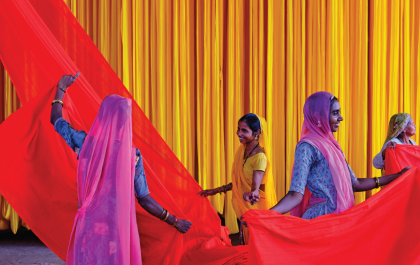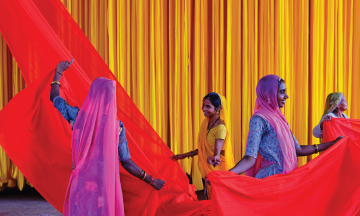By Raida A. K. Reza
For Bangladeshis, the weather is deeply linked with our culture. Our literature and music heavily feature the change in seasons. Even our traditions depend on the change in seasons. It therefore becomes obvious why it is such a personal disappointment for us when the weather becomes unpredictable. In a social setting, someone will always chime in “climate change” whenever one complains about the unpredictable ways the weather bothers us.
The word climate change is known to almost everyone in the world these days. The kind of awareness that climate scientists and activists brought to the public was and is still so profound that it is difficult for climate change deniers to be taken seriously. The two most common terms that are used while talking about actionable effort to curb the effects of climate change are “mitigation” and “adaption”. These both share the same purpose, reducing the undesirable impacts that are to come.
The extents of climate change in Bangladesh circle heavily around adaptation. Adaptation involves taking measures to adjust to the impacts of climate change that are already underway or expected in the future. These measures are extremely important for the people of Bangladesh to address the reality that is upon us and will be in the next few decades.
Mitigation measures, on the other hand, aren’t discussed in such a broad scale. Mitigation efforts aim to reduce greenhouse gas emissions in order to slow down the rate of global warming and to limit the magnitude of future climate change. This is, of course, because Bangladesh has a relatively low carbon footprint compared to many developed countries (our GHG emissions are estimated to be 0.4 percent of global emissions in 2018 according to a report by World Bank in 2022).
But the story of Bangladesh is not that the country is one of the most vulnerable countries from the effects of climate change, but it is also of its growth. Bangladesh is among the fastest growing economies in the world, with a 4% annual per income growth since the 90s. We went from an agricultural economy to an industry led one, and with the growth of industries, the GHG emissions rose from 115 million metric tons of carbon dioxide equivalent (MtCO2e) in 1990 to 221 MtCO2e in 2018.
This is, again, not a significant jump at all.

But consider this – Bangladesh economy is growing and will keep on growing. For this growth, climate change is a double-edged sword for us. Do we adapt so that we can keep on growing? Or do we focus on mitigation so that we do not have to worry about adapting in the future? The answer is both. We cannot ignore mitigation measures while growing our industries. It is best to start reducing greenhouse gas emissions now, because we won’t be able to slow down the pace of climate change once it starts getting worse.
Mitigation is no longer just a tool to combat climate change, it is also one to sustain our industries. With rising prices of resources such as raw materials and energy, the only way out for prosperity seems to be through mitigation. Investing in renewable energy and energy-efficient technologies can provide economic benefits for Bangladesh, including the creation of new jobs and reduced dependence on imported fossil fuels. Bangladesh has a strong track record of innovative and sustainable development initiatives and can be a role model for other countries in the region and globally by prioritizing mitigation efforts.
The impacts of climate change are already visible, and they will get worse. Who knows if future writers will get to romanticize the weather like we do/did, but we have to be vigilant in how we shape our future. Encourage policy makers to speak more about mitigations across all industries (and not just the export oriented ones), encourage businesses to become more sustainable, and know that you as a reader have the voice to make a difference.
Raida A. K. Reza is a resource efficiency specialist and works towards decarbonization. She dreams of a carbon neutral world where effects of climate change have been curbed. She is also the founder of Zero Waste Bangladesh.













